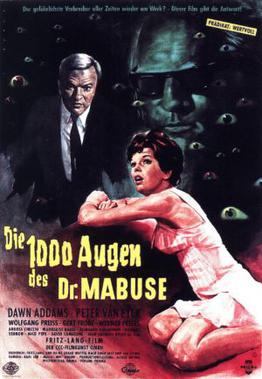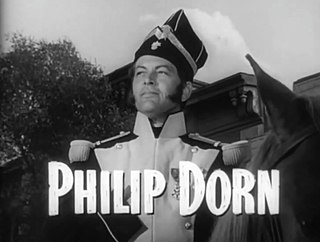
Thea Gabriele von Harbou was a German screenwriter, novelist, film director, and actress. She is remembered as the screenwriter of the science fiction film classic Metropolis (1927) and for the 1925 novel on which it was based. von Harbou collaborated as a screenwriter with film director Fritz Lang, her husband, during the period of transition from silent to sound films.

The Indian Tomb is a two-part 1921 German silent film directed by Joe May.

The Thousand Eyes of Dr. Mabuse is a 1960 black-and-white crime thriller film directed by Fritz Lang in his final film. A West German/French/Italian international co-production, it starred Peter van Eyck, Dawn Addams and Gert Fröbe. The film made use of the character Dr. Mabuse, who had appeared in earlier films by Lang in 1922 and 1933. The Thousand Eyes of Dr. Mabuse spawned a film series of German Mabuse films that were released over the following years to compete with Rialto Film's Krimi films.

The Tiger of Eschnapur is a 1959 West German-French-Italian adventure film directed by Fritz Lang. It is the first of two films comprising what has come to be known as Fritz Lang's Indian Epic; the other is The Indian Tomb(Das Indische Grabmal). Fritz Lang returned to Germany to direct these films, which together tell the story of a German architect, the Indian maharaja for whom he is supposed to build schools and hospitals, and the Eurasian dancer who comes between them.

Gustav Diessl was an Austrian artist, and film and stage actor.

Philip Dorn, sometimes billed as Frits van Dongen, was a Dutch American actor who had a career in Hollywood. He was best known for portraying the father in the film I Remember Mama (1948).

The Indian Tomb is a 1959 adventure film, co-written and directed by Fritz Lang. Produced by Artur Brauner, it is an international co-production of West Germany, France and Italy. It is the second film, after The Tiger of Eschnapur (1959), that comprise "Fritz Lang's Indian Epic" duology, which are based on the 1918 novel Das indische Grabmal, written by Lang's ex-wife Thea von Harbou.
The Tiger of Eschnapur may refer to:
Richard Eichberg was a German film director and producer. He directed 87 films between 1915 and 1949. He also produced 77 films between 1915 and 1950. He was born in Berlin, Germany and died in Munich, West Germany.

Olaf Holger Axel Fønss was a Danish actor, director, producer, film censor and one of Denmark and Germany's biggest stars of the silent film era.

Sabine Bethmann was a German film and television actress.
Claus Holm was a German film actor. He appeared in 50 films between 1943 and 1979. He was born in Bochum, Germany and died in Berlin, Germany.

The Indian Tomb is a 1938 German adventure film directed by Richard Eichberg and starring Philip Dorn, La Jana and Theo Lingen. It is the sequel to Eichberg's The Tiger of Eschnapur.

The Tiger of Eschnapur is a 1938 German film directed by Richard Eichberg and starring Philip Dorn, La Jana and Theo Lingen. It was followed by a second part The Indian Tomb which was released the same year.

CCC Film is a German film production company founded in 1946 by Artur Brauner. A Polish Jew who survived the Nazi era by fleeing to the Soviet Union, he lost dozens of relatives to the Nazis. His primary interest was making films about the Nazi era, but after his first such film failed at the box office, throwing him into debt, he began producing entertainment films, the commercial success of which then financed his Holocaust-related films, some of which also became successful. In 2009, Brauner donated 21 Holocaust-related films to Yad Vashem.

Josef Thomas Peterhans was a German stage and film actor.
Walter Wischniewsky was a German film editor who worked on over a hundred productions during his career. Wischniewsky also sometimes worked as an assistant director. Wischniewsky began his career during the Nazi era, but most productions he worked on were post-Second World War. He edited several rubble films, including The Berliner (1948). During the 1950s and 1960s he became one of the mainstays of German commercial cinema, working on the long-running Edgar Wallace and Karl May series. Wischniewsky edited Fritz Lang's Indian-shot The Indian Tomb and The Tiger of Eschnapur.
Willy Schatz (1903–1976) was a German art director of Baltic German origin. He designed the sets for numerous film productions in post-war West Germany including Fritz Lang's The Tiger of Eschnapur and The Indian Tomb in 1959.

Gisela Schlüter was a German cabaret performer and actress.














